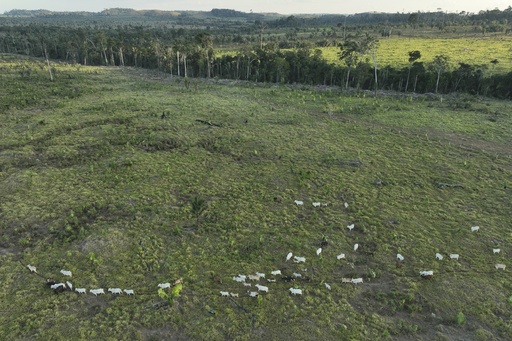
BRASILIA, Brazil — In various regions of Brazil, there is a growing movement among certain states to loosen rainforest protections as they respond to demands from cattle ranchers and soybean producers seeking to clear land for agricultural expansion. This push runs counter to the initiatives taken by President Luiz Inácio Lula da Silva, who resumed office last year and has been active in combatting the deforestation of the Amazon rainforest. The ongoing efforts to deregulate forest protections present a risk to Brazil’s pledge to stop deforestation by 2030, which is crucial as forest loss is the primary source of the country’s carbon emissions.
Alice Thuault, the executive director of the nonprofit Instituto Centro de Vida in Mato Grosso, pointed out that there is a noticeable and organized setback in conservation efforts. She acknowledged the vulnerability of ongoing initiatives aimed at reducing deforestation in various areas. The Accountability Framework Initiative (AFi), a coalition that monitors environmental supply chains, described this trend as a significant regression in the fight against deforestation.
Brazil’s nine states within the Amazon region are essential for safeguarding the rainforest. Together, they oversee approximately 220,000 square miles (564,000 square kilometers) of conservation lands, in addition to 12,600 square miles (32,600 square kilometers) of public forests that lack specific protection designations. This combined area is comparable in size to Ukraine.
In the state of Acre, a recently passed law that received unanimous approval allows for the privatization of nearly 347 square miles (900 square kilometers) of designated protected forest—an area roughly equivalent to New York City. The law aims to regularize the status of individuals who have settled illegally in five conservation units.
The local government of Acre, alongside prominent agricultural groups, has found common ground with Brazil’s communist party. State lawmaker Edvaldo Magalhães, during a speech in August, voiced that the newly introduced environmental legislation— which has also decreased penalties for illegal deforestation—will aid approximately 40,000 small-scale farmers. Although he claims the new measures will increase the forested area under protection, he did not elaborate on how this would be achieved. Magalhães has not responded to interview requests.
This legislation has garnered robust support from agribusiness representatives advocating for relaxed rainforest protections. Assuero Veronez, the president of the Federation of Agriculture and Livestock of Acre, expressed during an April 2023 parliamentary address, “The more forest, the more poverty.” As a cattle rancher, Veronez, who relocated from Brazil’s Southeast region, insists that forests do not yield financial returns and take up land that could otherwise serve agricultural purposes. He emphasized, “Beneath that hectare of forest, there is soil. If we cannot remove the forest, we cannot produce.”
Following the law’s passage, Acre’s Environment Secretary Julie Messias resigned, citing serious constitutional risks associated with the legislation. While she noted the importance of granting legal status to land occupants, Messias stressed that this must align with Brazil’s forest conservation laws. Acre Governor Gladson Cameli endorsed the law but delayed its activation until January 1, pending a legal review.
The anticipation of privatizing protected areas in Acre has triggered a rise in illegal deforestation. Satellite imagery analysis commissioned by a nonprofit organization revealed that from August to October, illegal deforestation in four protected areas shot up more than threefold compared to the previous year, equivalent to the size of six Central Parks.
Conditions have worsened significantly in the neighboring state of Rondonia, where local authorities are pursuing legal action to annul 11 conservation units and reduce protections for two others. Fires intentionally set in two designated areas, Guajara-Mirim and Soldado da Borracha, have destroyed a total of 668 square miles (1,730 square kilometers)—an expanse larger than Greater London, according to MapBiomas, an environmental monitoring network.
Pablo Viscardi, a prosecutor in Rondonia, stated that the fires have been deliberately used by individuals seeking legal claims to the land, employing forest fires to “consolidate” illegal land claims and obstruct reclamation efforts in areas from which they have been expelled.
Rondonia, along with Mato Grosso, has also repealed critical environmental regulations. The Soy Moratorium, established in 2006, saw traders and oil producers agree not to source soybeans cultivated on land recently deforested. Environmental advocacy groups and major commodity firms participated in this agreement. However, current regulations in Mato Grosso—Brazil’s leading soybean and beef-producing region—have compelled traders and oil producers to withdraw from this accord. A similar initiative is underway in the state of Para, indicative of a concerted effort to dismantle the soy moratorium.
Critics, including top soy producer associations in Brazil, argue that the moratorium is illegal, claiming it extends beyond the nation’s established anti-deforestation statutes. The government of Mato Grosso asserted that it concluded incentives linked to the moratorium, maintaining that the state enforces “the world’s strictest environmental regulations.” They clarified that any companies infringing national laws face penalties just as they would in any foreign jurisdiction.
As a fifth largest emitter of greenhouse gases globally, Brazil accounts for nearly 3% of worldwide emissions. Nearly half of the country’s carbon emissions are attributed to deforestation. The Amazon rainforest plays a crucial role in the climate system, hosting the most biodiversity of any forest on Earth and containing one-fifth of the planet’s freshwater resources.
